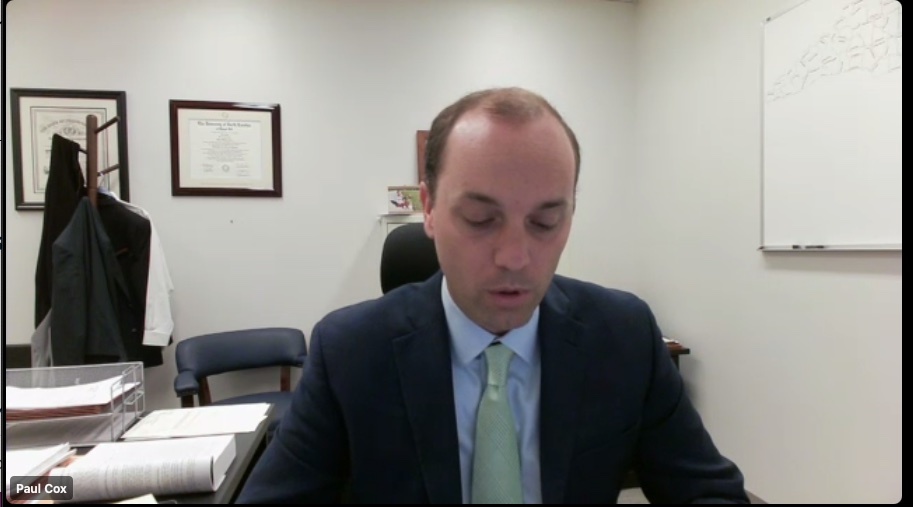- County complaints about the May primary led to the adoption of temporary rules.
The North Carolina State Board of Elections voted unanimously at their board meeting Tuesday to adopt temporary rule changes for election observers for the November general election. The vote came after a series of complaints from county boards of elections around the state following the May’s primary.
Accounts of observers allegedly getting too close to voting equipment, speaking to voters, and coming and going from the polling place without asking permission from the chief judge were among the complaints. The NCSBE said they received public comment between July 22-August 12.
“Participation from the public was substantial and substantive,” Paul Cox, legal counsel for NCSBE, told the board before the vote. “The board received 150 emails, two letters, and over 1,000 comments through our web portal.”
He said the draft rules were based on input from county directors of elections who had experienced new issues at the voting place with partisan election observers and county-appointed precinct officials. Primarily, the rules center on the precinct officials’ authority to remove election workers who leave their designated area, are getting too close to tabulators or other confidential voter information, or seem to be coming and going from the polling place too often.
Cox said there wouldn’t be time to change the rules permanently before early voting began on October 20 because the process would’ve needed to be done by May 24. At that time, counties were canvassing, and there wouldn’t have been enough time for feedback from the counties.
According to the members, state board staff saw a higher than usual uptick in the number of questions from counties about the observer appointment process and observer conduct at the polls in the May primary. They said the lack of clarity in observer appointment rules, may pose a problem for counties going into November.
This year, parties will be able to sign their lists electronically rather than by paper, something that Cox indicated was to simplify the appointment process.
Some of the observer behaviors that have raised red flags in past years remain against the rules; like posting materials in polling places, questioning poll workers carrying out their duties, talking to voters in the enclosure about political issues, interfering with voters submitting their ballots into the tabulator, asking to photograph voter forms with confidential information on it, following poll workers to their cars and filming them after they closed the polls, and getting into a confrontation with a voter.
Under state law, intimidation of a voter or election official is prohibited conduct and a criminal act.
Cox suggested that the board prohibit county board members and staff from serving as partisan observers in elections. They consider it to set up a potential conflict with board member staff duties to carry out elections impartially. He made the distinction that precinct officials are county poll workers that are elected officials that take an oath of office when they are appointed to conduct the election impartially as opposed to party-appointed observers.
The amendment added a list of prohibited conduct by precinct officials that include tampering with voting equipment, and making statements about personal political views while the election is going on. Other changes to the rule would require poll workers to inform the county board if they become disqualified to serve based on becoming a candidate, holding elective office, or holding office in a political party and would apply to election or one-stop workers.
Board member Tommy Tucker asked about how the request for designated doors for observers came about. Cox said some observers complained that they couldn’t use doors at a polling place that was designated specifically for staff to go to a curbside voting enclosure and come back in. Tabulators were also next to the doors, and the staff would have to monitor the coming and going to ensure they weren’t tampered with.

Tucker followed up with a suggestion that signage could be used instead of changing the rules for the whole state since only two counties made that complaint. Board Chair Damon Circosta agreed and said member Stacy “Four” Eggers was working on a slight amendment to the rule, but they need to adhere to the statutes set up for observers.
Eggers made the motion that tasks and duties of precinct officials in voting places as submitted to them be accepted and to adopt rules for election observers with the following two changes. First, replace language that the county director of elections on behalf of the county party chair shall provide the list to the chief judge of each precinct on or before election day.
The second is to change the language for the use of doors, to say that using doors designated for precinct officials or one-stop workers unless authorized by the chief judge at the voting place will be allowed. Observers need not wait in the voting line to enter the voting enclosure. All board members voted in favor of the changes.
Eggers said the change of providing the list to the chief judge of each precinct on or before election day was done as a matter of efficiency having the county elections director handle all the observers centralizes it to one location. It also avoids having the party chair go to anywhere between 10 and 200 precincts on election day only to be met with the question, “Who are you, and what are you doing here?”
Following Tuesday’s vote, the temporary rules will now go before the state Rules Review Commission, just as permanent rules do.